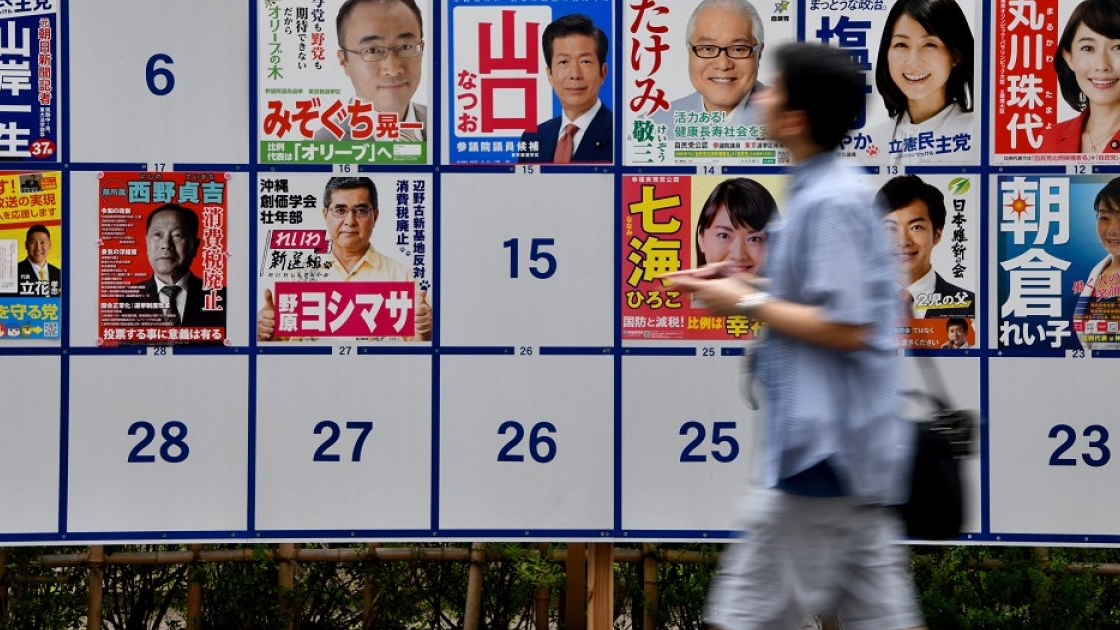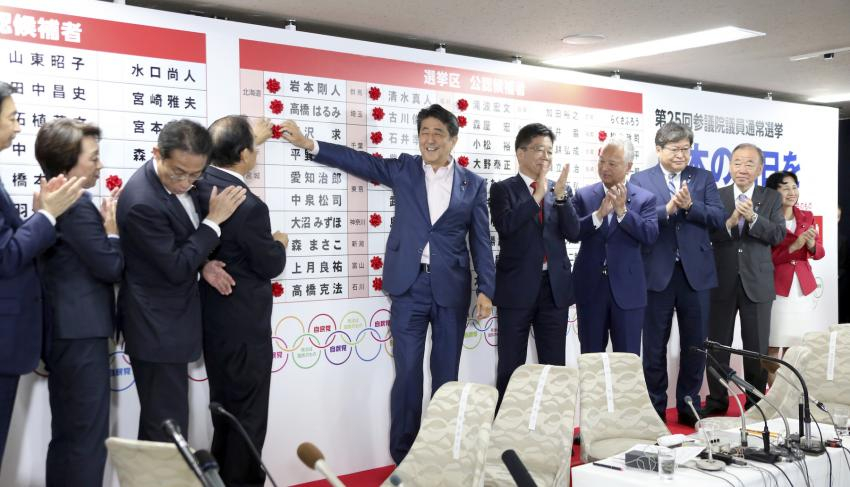

The upper house election held on Sunday was one of the most important elections for Japanese Prime Minister Shinzo Abe. In his following press conference on Monday, Prime Minister Shinzo Abe said "This was not an election to choose the government, but it was an election to seek stability in the government."
Abe made promises to tackle Japan's fast aging society and provide free education for young children. He also pledged continued and increased economic recovery efforts.
Abe called the election one that was defined by constitutional debate. He criticized the opposition for not joining the debate on the constitution revision in the Diet, Japan's parliament, and said that the results of the election reflected public criticism on the issue. "This was an election to decide on parties that are willing to debate on the constitution revision or parties that ignore the debate."
"It is the public that decides the constitution revision and it is our job in the government to come up with the appropriate draft of the constitution revision," continued Abe.
Eyeing to revise the Japanese pacifist constitution by the end of his term in September 2021, Abe had hoped to secure two-thirds of the upper house chamber in this election.
Read More:
Abe wins upper house poll but suffers constitutional reform setback
Two-thirds is the crucial number of seats held together with the pro-revision parties to initiate the constitution revision bill.
The pro-revisions parties, the Liberal Democratic Party, Komeito Party, and Japan Innovation Party only managed to secure 81 seats out of 85 needed to initiate the revision.

An election official runs with an unopened ballot box for Japan's upper house election at a counting center in Tokyo, Japan, July 21, 2019. /Reuters Photo
The voting rate was the second-lowest 48.80 percent on record, showing strong political apathy in the country.
Many of the voters interviewed during the exit polls said they saw no substantial policies debated among the candidates.
Mr. Matsumoto, a businessman in his 40s said "We have not seen any change in the debates in the last few elections. I don't [see] any clear promise for better politics.”
A university student who asked not to be named said she was not inspired by the arguments. "We have talked about social welfare for older generations, but I don't see any promise for the young generations."
Though many of the candidates criticized their opponents, there were few concrete policies outlined on important issues, such as economic recovery, social welfare, and childcare.
Moreover, the nature of the upper house election in Japan have always struggled to attract voters' interests.
The election is every three years, with half of 245 seats running for a six year term. This format makes it hard for it to have a significant impact on the political balance unless the ruling and opposition parties are in a close balance.

Japanese Prime Minister Shinzo Abe (C) smiles with LDP lawmakers in front of red rosettes on the names of his party's winning candidates during ballot counting for the upper house elections at the party headquarters in Tokyo, Japan, July 21, 2019. /AP Photo
Though the election may be over, experts say the battle in the Japanese Diet is not over.
It's called the "mowings," a form of headhunting. The ruling parties and opposition alike will approach the smaller parties or independent lawmakers to support their bills.
The opposition camp will desperately try to stop the pro-constitution revision parties to secure the crucial four lawmakers to set the bill in motion.
Once the bill is initiated, by law, the government has between 60 to 180 days to hold a public referendum.
Given the deadline Abe has until the end of his term in September 2021, Abe is likely to eye to initiate the motion after the Tokyo 2020 Olympics and Paralympics.
One of the scenarios is to dissolve the lower house for a general election soon after the Olympics, extending lower house terms for another six years.
There is already debate in the ruling LDP for allowing Abe to run for another term. However, Shinzo Abe is cautious in not give a wrong impression to the public at the moment.
Abe will likely work on improving his support rate for the moment until such a debate could be discussed.

Copyright © 2018 CGTN. Beijing ICP prepared NO.16065310-3
Copyright © 2018 CGTN. Beijing ICP prepared NO.16065310-3